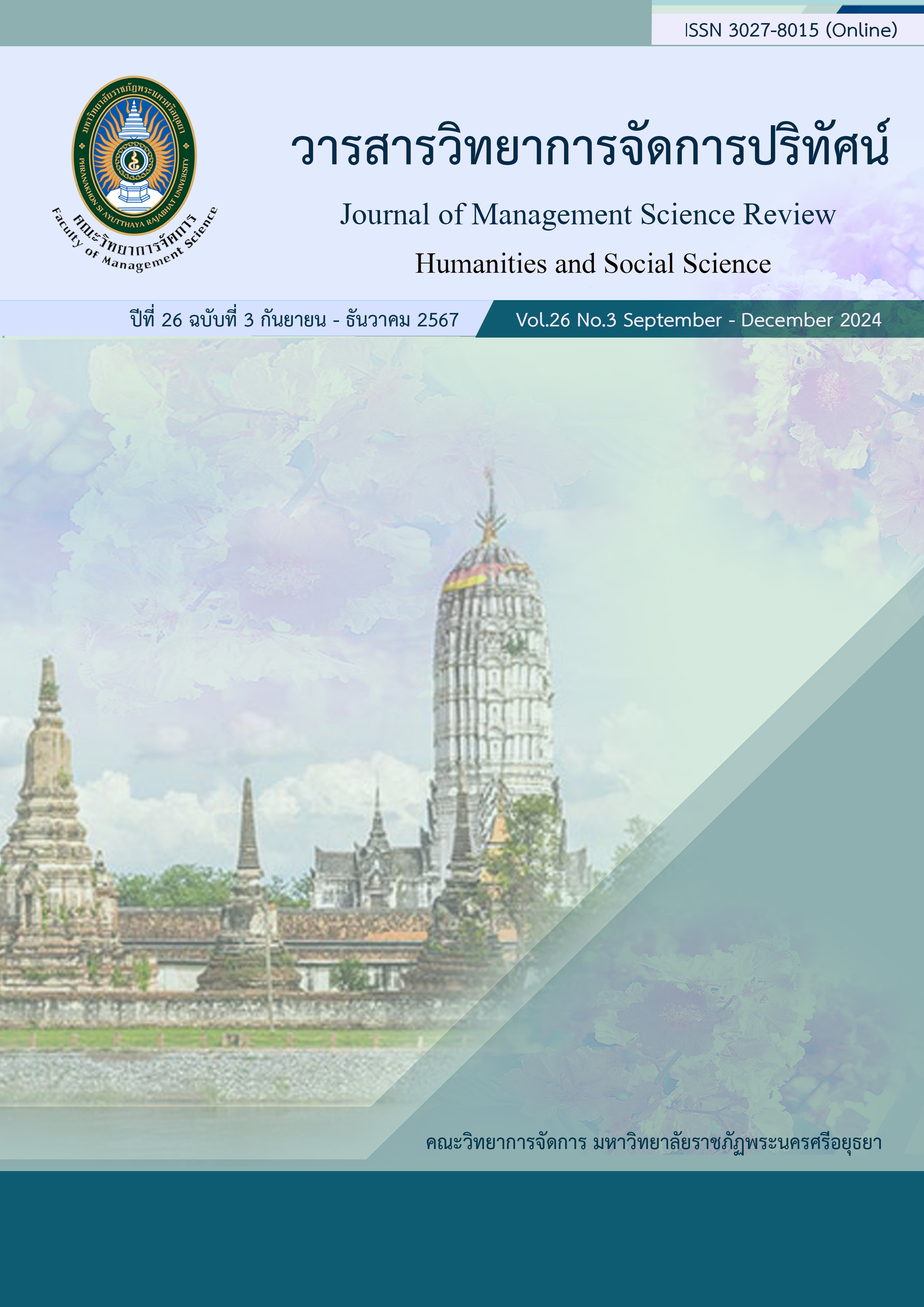กลยุทธ์ทางการตลาด 5.0 กับการพัฒนาศักยภาพผลิตภัณฑ์สมุนไพรไทย
คำสำคัญ:
กลยุทธ์ทางการตลาด 5.0, การพัฒนา, ผลิตภัณฑ์สมุนไพร, สมุนไพรไทยบทคัดย่อ
บทความวิชาการนี้มุ่งอธิบายเกี่ยวกับกลยุทธ์ทางการตลาด 5.0 กับการพัฒนาศักยภาพผลิตภัณฑ์สมุนไพรไทย เนื้อหาประกอบด้วยความหมายของกลยุทธ์ทางการตลาด 5.0 ความสำคัญของการวิเคราะห์สภาพแวดล้อมภายในและสภาพแวดล้อมภายนอก (SWOT Analysis) การตลาดของผลิตภัณฑ์สมุนไพรไทยในช่วงปี พ.ศ. 2562-2567 และแนวทางในการพัฒนาศักยภาพผลิตภัณฑ์สมุนไพรไทย โดยมีจุดมุ่งหมายเพื่อหาแนวทางกลยุทธ์ทางการตลาด 5.0 ในการพัฒนาศักยภาพผลิตภัณฑ์สมุนไพรไทยจากปัญหาการตลาดของผลิตภัณฑ์สมุนไพรไทยในช่วงปี พ.ศ. 2562-2567 ที่มีการแข่งขันในตลาดที่รุนแรง รวมถึงการเปลี่ยนแปลงของพฤติกรรมผู้บริโภคในยุคที่เทคโนโลยีมีการใช้ปัญญาประดิษฐ์ (AI) เพิ่มมากขึ้น สำหรับแนวทางในการพัฒนาผลิตภัณฑ์สมุนไพรไทยเพื่อเสริมสร้างประสิทธิภาพของผลิตภัณฑ์นั้น อาศัยการหลักการ SWOT Analysis ร่วมกับกลยุทธ์ทางการตลาด 5.0 ได้แก่ Data-Driven marketing, Agile marketing, Predictive marketing, Contextual marketing และ Augmented marketing เป็นแนวทางที่ช่วยให้ผลิตภัณฑ์สมุนไพรไทยพัฒนาได้อย่างเกิดประสิทธิผลและสามารถต่อยอดไปสู่การค้าในตลาดโลกได้อย่างมีประสิทธิภาพต่อไปในอนาคตอย่างยั่งยืน ซึ่งจะเป็นประโยชน์สามารถนำไปใช้ในสร้างภาพลักษณ์และส่งเสริมการตลาดสมุนไพรตลอดจนขยายตลาดเชิงรุกทั้งในประเทศ และต่างประเทศ
เอกสารอ้างอิง
Akkaya, B. (2021). Leadership 5.0 in Industry 4.0: Leadership in perspective of organizational agility. In Research anthology on cross-industry challenges of Industry 4.0 IGI Global (pp. 1489-1507). DOI:10.4018/978-1-7998-8548-1.ch074
Boitrelle, F., Shah, R., Saleh, R., Henkel, R., Kandil, H., Chung, E., & Agarwal, A. (2021). The sixth edition of the WHO manual for human semen analysis: a critical review and SWOT analysis. Life, 11(12), 1368.
Chantanapelin, S., Jaisaleaow, A., & Anorat, K. (2024). Marketing Strategies for Promoting Organic Community Products: A Case Study of Agricultural Product Management Learning Center (Farmer's Market) in Chiang Rai Province. Journal of Community Development and Life Quality, 11(2), 123-134.
Chitphong, W. (2022). Marketing strategies of the home Building business in the next normal era consumer perspectives in Bangkok. [Master’s thesis]. Mahidol University
Euromonitor International. (2022). Retail Value RSP Herbal/Traditional Products.
Hysa, B., Karasek, A., & Zdonek, I. (2021). Social media usage by different generations as a tool for sustainable tourism marketing in society 5.0 idea. Sustainability, 13(3), 1018.
Lapbunruang, S., Jittmonkol, S., & Chaisena, Y. (2024). Digital marketing strategies affecting the overall operation of hotel business in the Northeast of Thailand. NEU Academic and research journal, 11(3), 170-183.
Phalaphon, K., Tawinruka, P., & Rukhirana, M. (2023). Applying a creative process approach to incorporate contemporary public relations into herb products. Journal of Digital Business and Social Sciences, 9(2), 1-12.
Philip, K., Hermawan, K., & Iwan, S. (2021). Marketing 5.0: Technology for humanity. Wiley.
Puyt, R., Lie, F. B., De Graaf, F. J., & Wilderom, C. P. (2020). Origins of SWOT analysis. https://doi.org/10.5465/AMBPP.2020.132.
Sima, E. (2021). Managing a brand with a vision to marketing 5.0. In MATEC Web of Conferences (Vol. 343, p. 07015). DOI:https://doi.org/10.1051/matecconf/202134307015
Sulistyaningsih, E. (2023). Improving human resources technology innovation as a business growth driver in the Society 5.0 era. ADI Journal on Recent Innovation, 4(2), 149-159.
Sukcharoen, W. (2023). Market-share changing and pricing simulations of Thai Herbal Soap Using 3D-Perceptual Map. Journal of Business Administration and Accountancy, 4(2), 141-162.
Thanitnithiphan, T. (2023). Development approach of potential of medicines and products from Thai herbs to international standards. The National Defence College of Thailand Journal, 64(3), 54-66.
Urairat, D. (2024). Role of Foreign and the Economic Development of Thailand. Journal of Dhamma for Life, 30(2), 418-430.
Uraisripong, A., & Wonginta, T. (2024). The Analysis of the Pepper Value Chain of Chanthaburi Province. Journal of Management and Development Ubon Ratchathani Rajabhat University, 10(1), 21-36.
Waisbord, S. (2020). Family tree of theories, methodologies, and strategies in development communication. Handbook of communication for development and social change (pp. 93-132). DOI:10.1007/978-981-15-2014-3_56





